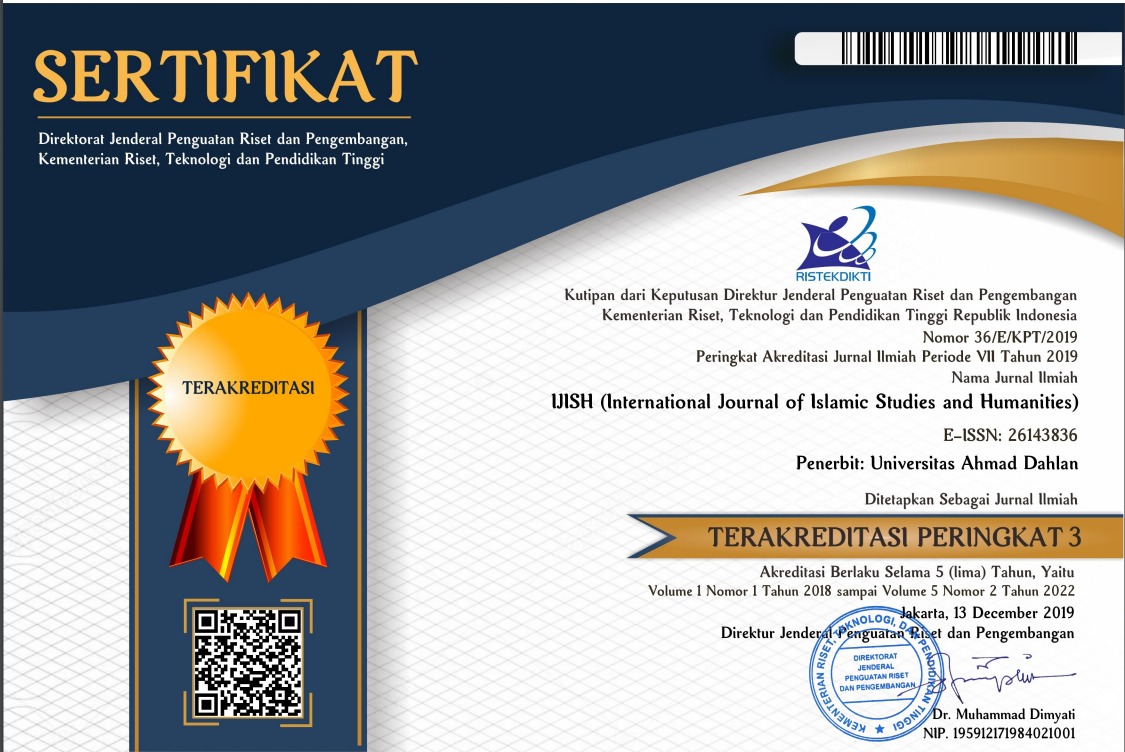Unveiling the true concept of al-wala' wal baro': a refreshing perspective on aqidah nir radicalism in islamic education
DOI:
https://doi.org/10.26555/ijish.v6i1.7953Keywords:
Al-wala' wal baro', Islamic education, Contemporary Islamic studies, Radicalism, AqidahAbstract
Aqidah is the theological foundation of Islam, and among its requirements for a Muslim is understanding and practicing the concept of al-wala' wa'l-baro'. However, this concept is often misunderstood in practice. This research aimed to clarify al-wala' wa'l-baro' as a normal ideology without any radical elements, using a qualitative literature review approach. The results show that 1) al-wala', which signifies loyalty to fellow Muslims, is a normal concept.; 2) Additionally, al-baro' refers to turning away from neglectful elements, but Muslims can still act humanely towards polytheists as long as they are not openly fighting against Islam.; 3) Furthermore, Islamic education plays a vital role in instilling aqidah without any radical elements. The findings of this study also provide a new perspective on Islamic education by reinterpreting the concept of aqidah without any radical elements. This research contributes to the discourse on aqidah, al-wala' wal baro', and Islamic education, providing insights that can help in promoting a balanced understanding of these concepts and countering misinterpretations that may lead to radical ideologies, thereby contributing to the intellectual discourse on contemporary Islamic studies.
References
Adi Kasman; dkk. (2022). Islamic Education as a Strengthening of Aqidah and Akhlaq in The Society 5.0 Era. Cendekia: Jurnal Kependidikan Dan Kemasyarakatan, 20(2), 181–189.
Ahmad, F. R. A. (2019). Urgensi penanaman aqidah dalam pendidikan islam. Jurnal Kajian Islam Dan Pendidikan Tadarus Tarbawy, 1(2), 99–108. https://doi.org/10.31000/jkip.v1i2.1997
Ari, A. W. (2016). Syura dan Demokrasi: Antara Teori dan Prakteknya dalam Dunia Islam. Jurnal Ilmu Agama: Mengkaji Doktrin, Pemikiran, Dan Fenomena Agama, 17(2), 231–240.
Arikunto, S. (2002). Metodologi Penelitian Suatu Pendekatan Proposal. In 2017. PT. Rineka Cipta.
Asrori, S., Jamilah, J., Ismail, M., Rozi, A. J., Ramdani, D., Hady, Y., & Roup, M. (2020). Encouragement of Jihad Arguments for Radicalization and Extremism in Indonesia. Proceedings of the 2nd International Conference on Islam, Science and Technology (ICONIST 2019), 129–133. https://doi.org/10.2991/assehr.k.200220.023
At-Thabari, I. J. (1994). Tafsir al-Thabari (1st ed.). Mu’assasah Ar-Risalah.
Benny Prasetiya; dkk. (2018). Penguatan Nilai Ketauhidan dalam Praksis Pendidikan Islam. Journal of Islamic Education, 3(1), 1–15.
Brachman, J. M. (2008). Global jihadism: Theory and practice. Routledge. https://doi.org/10.4324/9780203895054
Bukay, D. (2013). Islam’s hatred of the non-muslim. Middle East Quarterly, Summer, 11–20.
Creswell, J. W., & Poth, C. N. (2007). Qualitative inquiry and research design: Choosing among five approaches. In Sage publications.
Darmalaksana, W. (2020). Metode Penelitian Kualitatif Studi Pustaka dan Studi Lapangan. In Pre-print Digital Library UIN Sunan Gunung Djati Bandung (pp. 1–6).
Erturk, O. F. (2022). The Myth of Turkish Islam: the influence of Naqshbandi-Gümüşhanevi thought in Turkish Islamic orthodoxy. British Journal of Middle Eastern Studies, 49(2), 223–247. https://doi.org/10.1080/13530194.2020.1782727
Fadli, M. R. (2021). Memahami desain metode penelitian kualitatif. Humanika, 21(1), 33–54. https://doi.org/10.21831/hum.v21i1.38075
Fajar, A. S. M. (2019). Perspektif Ibnu Khaldun Tentang Perubahan Sosial. SALAM: Jurnal Sosial Dan Budaya Syar-I, 6(1), 1–12. https://doi.org/10.15408/sjsbs.v6i1.10460
Imam Mashuri; dkk. (2020). Penguatan Aqidah Aswaja dalam Rangka Membentengi Siswa SMAN 1 Genteng dari Radikalisme. ABDI KAMI: Jurnal Pengabdian Kepada Masyarakat, 3(2), 246–258.
Khaerudin. (2014). Penanaman pendidikan aqidah pada anak usia dini. Madaniyah, 4(1), 45–57.
Literasi Media Dalam Menangkal Radikalisme Pada Siswa. (2021). Jurnal Interaksi : Jurnal Ilmu Komunikasi, 5(1), 31–41. https://doi.org/10.30596/interaksi.v5i1.5564
Ma’ruf, A. (2016). Global Salafism sebagai Gerakan Revivalisme Islam. Jurnal Al-Murabbi, 1(2), 243–272.
More than the Voice of the Caliphate: The Destructive Legacy of Abu Muhammad Al-Adnani. (2016). International Journal of Political Science, 2(4), 86–94. https://doi.org/10.20431/2454-9452.0204009
Muhammad Said al-Qathani. (1995). Al-Wala’ wal Baro’. Dar Thayibah.
Muhtadi, B. (2019). Violent Ekstremism dalam Sudut Pandang Studi Agama. In Asking Sensitive.
Murjani. (2022). Information Technologyon Aqidah Education and Adolescent’s Character. Indonesian Journal of Education, 2(1), 50–58.
Sabila, N. A. (2020). Integrasi Aqidah Dan Akhlak (Telaah Atas Pemikiran Al-Ghazali). NALAR: Jurnal Peradaban Dan Pemikiran Islam, 3(2), 74–83. https://doi.org/10.23971/njppi.v3i2.1211
Saifudin Asrori. (2019). Mengikuti Panggilan Jihad; Argumentasi Radikalisme dan Ekstremisme di Indonesia. Aqlam: Journal of Islam and Plurality, 4(1), 118–113.
Setiawan, I. (2021). Peradaban Ilmu Andalusia: Masa Puncak dan Kehancurannya. Jurnal Tamaddun : Jurnal Sejarah Dan Kebudayaan Islam, 9(2), 777–792. https://doi.org/10.24235/tamaddun.v9i2.8905
Shalih bin Fauzan. (2005). Kitab Tauhid. Ummul Quro.
Sururin. (2004). Ilmu Jiwa Agama. Rajagrafindo Persada.
Weeks, D. (2020). Comparing Ideologies: Al Muhajiroun, Al Qaeda, and Islamic State. In Al Muhajiroun (pp. 223–254). Springer International Publishing. https://doi.org/10.1007/978-3-030-35840-2_7
Downloads
Published
How to Cite
Issue
Section
License
Copyright (c) 2023 Yusuf Hanafiyah, Zalik Nuryana, Yazida Ichsan

This work is licensed under a Creative Commons Attribution-ShareAlike 4.0 International License.
Authors who publish with IJISH (International Journal of Islamic Studies and Humanities) agree to the following terms:
- Authors retain copyright and grant the journal right of first publication with the work simultaneously licensed under a Creative Commons Attribution License (CC BY-SA 4.0) that allows others to share the work with an acknowledgment of the work's authorship and initial publication in this journal.Â
- Authors are able to enter into separate, additional contractual arrangements for the non-exclusive distribution of the journal's published version of the work (e.g., post it to an institutional repository or publish it in a book), with an acknowledgment of its initial publication in this journal.
- Authors are permitted and encouraged to post their work online (e.g., in institutional repositories or on their website) prior to and during the submission process, as it can lead to productive exchanges, as well as earlier and greater citation of published work.

This work is licensed under a Creative Commons Attribution-ShareAlike 4.0 International License.






